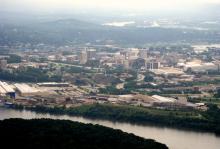Pilot Project Brings Telehealth to Barbershops and Salons for Hypertension Screening
Community anchor institutions like public libraries, schools, and government buildings have long served as backbones for initiatives to better connect communities and in doing so open up a world of possibilities that come with Internet access. Add to that list barbershops and salons, because one project is combining robust broadband and hypertension screenings to achieve better health outcomes for communities in urban areas around the country.
The project was conceived last winter by Craig Settles, who’s been working with public and private groups to advance community broadband efforts for more than a decade. At (eventually) ten locations in places like Cleveland, Wilson County, North Carolina, Chicago, and Denver, Settles is leading an effort to bring hypertension screening to urban areas by partnering with barbershops and salons. The aim is to leverage all of the unique characteristics of these businesses — including their strong community ties, their place as a social hub, the trust they hold with their customers, and the regularity with which they see them — to pioneer early detection and eventually ongoing treatment of high blood pressure and the constellation of associated complications (like coronary artery disease, stroke, and heart failure) that go with it. It's a problem that disproportionately affects the African American population.
Settles told one news outlet:
Many hair dressers and barbers see their customers every other week or so, and shops and salons are tight communities. It’s noticeable when someone disappears and you find out later that the person is disabled by a stroke, or has died from a heart attack.
Old Idea, New Twist




